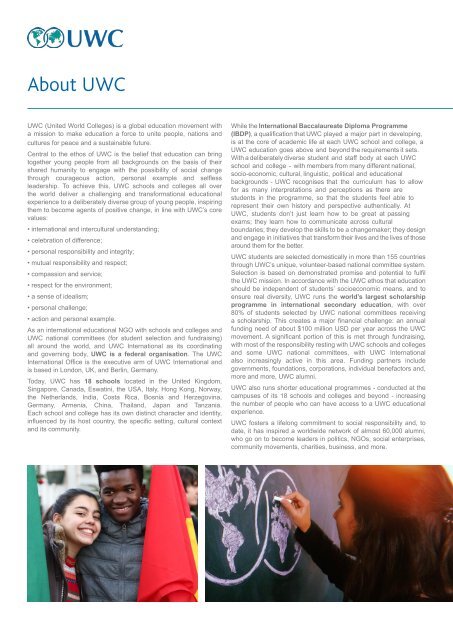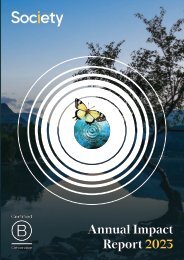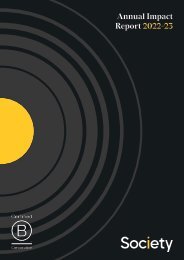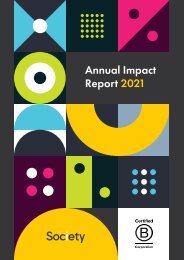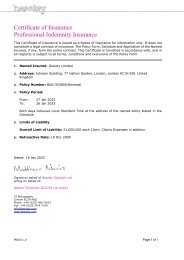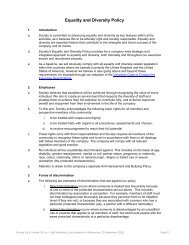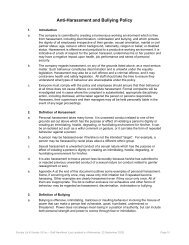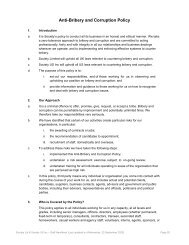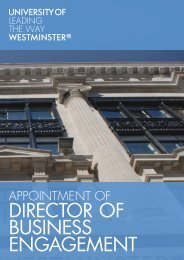UWC Candidate Pack
You also want an ePaper? Increase the reach of your titles
YUMPU automatically turns print PDFs into web optimized ePapers that Google loves.
About <strong>UWC</strong><br />
<strong>UWC</strong> (United World Colleges) is a global education movement with<br />
a mission to make education a force to unite people, nations and<br />
cultures for peace and a sustainable future.<br />
Central to the ethos of <strong>UWC</strong> is the belief that education can bring<br />
together young people from all backgrounds on the basis of their<br />
shared humanity to engage with the possibility of social change<br />
through courageous action, personal example and selfless<br />
leadership. To achieve this, <strong>UWC</strong> schools and colleges all over<br />
the world deliver a challenging and transformational educational<br />
experience to a deliberately diverse group of young people, inspiring<br />
them to become agents of positive change, in line with <strong>UWC</strong>’s core<br />
values:<br />
• international and intercultural understanding;<br />
• celebration of difference;<br />
• personal responsibility and integrity;<br />
• mutual responsibility and respect;<br />
• compassion and service;<br />
• respect for the environment;<br />
• a sense of idealism;<br />
• personal challenge;<br />
• action and personal example.<br />
As an international educational NGO with schools and colleges and<br />
<strong>UWC</strong> national committees (for student selection and fundraising)<br />
all around the world, and <strong>UWC</strong> International as its coordinating<br />
and governing body, <strong>UWC</strong> is a federal organisation. The <strong>UWC</strong><br />
International Office is the executive arm of <strong>UWC</strong> International and<br />
is based in London, UK, and Berlin, Germany.<br />
Today, <strong>UWC</strong> has 18 schools located in the United Kingdom,<br />
Singapore, Canada, Eswatini, the USA, Italy, Hong Kong, Norway,<br />
the Netherlands, India, Costa Rica, Bosnia and Herzegovina,<br />
Germany, Armenia, China, Thailand, Japan and Tanzania.<br />
Each school and college has its own distinct character and identity,<br />
influenced by its host country, the specific setting, cultural context<br />
and its community.<br />
While the International Baccalaureate Diploma Programme<br />
(IBDP), a qualification that <strong>UWC</strong> played a major part in developing,<br />
is at the core of academic life at each <strong>UWC</strong> school and college, a<br />
<strong>UWC</strong> education goes above and beyond the requirements it sets.<br />
With a deliberately diverse student and staff body at each <strong>UWC</strong><br />
school and college - with members from many different national,<br />
socio-economic, cultural, linguistic, political and educational<br />
backgrounds - <strong>UWC</strong> recognises that the curriculum has to allow<br />
for as many interpretations and perceptions as there are<br />
students in the programme, so that the students feel able to<br />
represent their own history and perspective authentically. At<br />
<strong>UWC</strong>, students don’t just learn how to be great at passing<br />
exams; they learn how to communicate across cultural<br />
boundaries; they develop the skills to be a changemaker; they design<br />
and engage in initiatives that transform their lives and the lives of those<br />
around them for the better.<br />
<strong>UWC</strong> students are selected domestically in more than 155 countries<br />
through <strong>UWC</strong>’s unique, volunteer-based national committee system.<br />
Selection is based on demonstrated promise and potential to fulfil<br />
the <strong>UWC</strong> mission. In accordance with the <strong>UWC</strong> ethos that education<br />
should be independent of students’ socioeconomic means, and to<br />
ensure real diversity, <strong>UWC</strong> runs the world’s largest scholarship<br />
programme in international secondary education, with over<br />
80% of students selected by <strong>UWC</strong> national committees receiving<br />
a scholarship. This creates a major financial challenge: an annual<br />
funding need of about $100 million USD per year across the <strong>UWC</strong><br />
movement. A significant portion of this is met through fundraising,<br />
with most of the responsibility resting with <strong>UWC</strong> schools and colleges<br />
and some <strong>UWC</strong> national committees, with <strong>UWC</strong> International<br />
also increasingly active in this area. Funding partners include<br />
governments, foundations, corporations, individual benefactors and,<br />
more and more, <strong>UWC</strong> alumni.<br />
<strong>UWC</strong> also runs shorter educational programmes - conducted at the<br />
campuses of its 18 schools and colleges and beyond - increasing<br />
the number of people who can have access to a <strong>UWC</strong> educational<br />
experience.<br />
<strong>UWC</strong> fosters a lifelong commitment to social responsibility and, to<br />
date, it has inspired a worldwide network of almost 60,000 alumni,<br />
who go on to become leaders in politics, NGOs, social enterprises,<br />
community movements, charities, business, and more.


